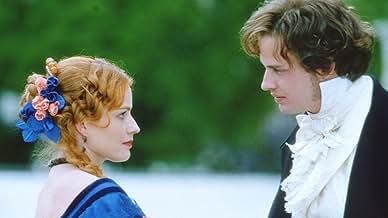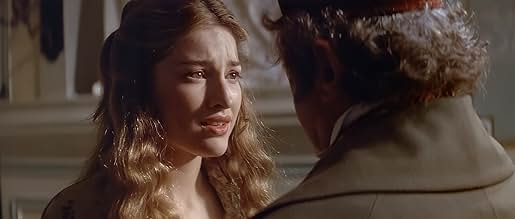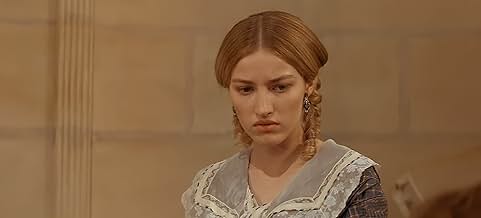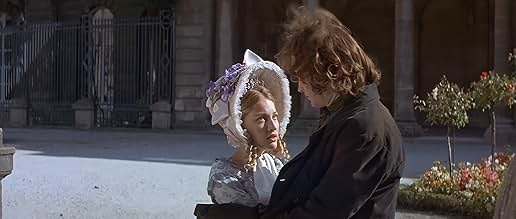Au sein de la famille aristocratique des Hulot, une série d'infidélités sexuelles, de malheurs financiers et de manipulations de sentiments est sur le point de provoquer d'inoubliables feux ... Tout lireAu sein de la famille aristocratique des Hulot, une série d'infidélités sexuelles, de malheurs financiers et de manipulations de sentiments est sur le point de provoquer d'inoubliables feux d'artifices.Au sein de la famille aristocratique des Hulot, une série d'infidélités sexuelles, de malheurs financiers et de manipulations de sentiments est sur le point de provoquer d'inoubliables feux d'artifices.
- Réalisation
- Scénario
- Casting principal
- Récompenses
- 1 victoire et 1 nomination au total
Avis à la une
The plot is complicated, too much so to describe in 1,000 words. Let's just say Cousin Bette is a tale of familial revenge set in 1840s Paris. Cousin Bette is the spinster aunt of a large wealthy family in the throes of loosing it all; money, dignity and respect. As they struggle, Bette (Lange) weaves her plots, many of which go astray working unintended consequences. This is a delightful black comedy that I liked very much, more so than most reviewers and commentators. If you have a predilection for this kind of movie, jump right in.
"Cousin Bette" is a witty and deliciously mean-spirited black comedy. The operative term, however, is "mean-spirited," so this film is not for all tastes. Cousin Bette is victimized (at least in her own mind) by her selfish and unfeeling relatives. Based on a Balzac novel, the story follows Bette's attempts to find love and to get even with those she believes have wronged her. Things don't ever work out as Cousin Bette plans, but the lady proves she is adaptable. Jessica Lange, despite her beauty made me believe that she was an unattractive spinster. Bob Hoskins was, as always, excellent, as was Elizabeth Shue, who nearly stole the show. Good stuff. Recommended.
I'm not familiar with Balzac's novel, but I've read a ton of Romantic literature. And this is one of its classic variations (The virtuous are redeemed). I would never have selected this movie myself (friends did) but I enjoyed it. If I described this as Madame Iago, you'd have the entire plot. Nothing is quite so much fun as watching someone who's been disrespected revenging herself on a crowd, especially after how needlessly cruel they've been. Since the playing field will never roll the arrangement back in Bette's favor, why not just destroy everyone? It's like a bomb went off when she's done. I am in no way a fan of Lange, but she's adequate (while looking distressingly like Jim Carrey in drag).
On the minus side, the lead-up to the 1848 Revolution is trivialized. The writing is extremely weak (Point A is always too overtly connected to Point B), and the lighting of every scene is too brazen. The accents are all over the place, which becomes very distracting.
On the minus side, the lead-up to the 1848 Revolution is trivialized. The writing is extremely weak (Point A is always too overtly connected to Point B), and the lighting of every scene is too brazen. The accents are all over the place, which becomes very distracting.
Most costume dramas about a poor relation follow a similar trail: The poor one, filled with high expectations and good intentions, gets the money and true love by suffering through a series of pitfalls, only to be winking at the audience by the ending credits. Our Cousin Bette gets there, but she chooses another road, perhaps more hazardous, but infinitely more entertaining for us.
This fascinating tale is about a relative who is treated poorly by everyone in her aristocratic family, while they themselves live in debt, denial, and high fashion. Jessica Lange plays the title character with a cynical smirk, as though she's daring every one to call her out, yet she knows – only too well - that people are so consumed by their own personal dramas that they ignore the fine details.
Described as "the bad seed who refused to blossom", Bette is the sister of Adeline, who languidly takes her time dying, while instructing her spinster sibling as to what flowers to lay on her casket. One look at the two – Adeline in her death-bed finery and Bette, in a basic drab dress, devoid of any adornment – and it's all too evident where the balance of power resides.
Bette: (to Jenny) "How could you know? You don't know who I was sacrificed to – to Adeline. They slapped me and caressed her. I went dressed like a wretch and she like a fine lady. Adeline, the garden, peel the vegetables, Bette. She never lifted a finger except to tie her ribbons."
Describing herself as a "country peasant", Bette lives in the slums of Paris, working as a costume seamstress to the reigning burlesque star of the day, Jenny Cadine (played by Elizabeth Shue), who vainly shows off her derrière before every final curtain is rung down. Jenny puts off the ticking clock of time by enjoying the attentions of her many rich – and generous - admirers, yet one fateful day encounters her worst nightmare.
Jenny: "I'm 24 I may as well be dead."
Bette: "You were 24 years old yesterday and it didn't seem to bother you then."
Jenny: "Today, while I was walking in the park, I came across a hideous old woman, face swollen and scratched; she stank of stale wine and sweat. In her filthy tresses she had placed a beauty patch, one red camellia I knew at once who she was - she was known as Carabine, the most famous courtesan in Paris. Everyone envied her dazzling shoulders, her milky skin. She had a neck so smooth it might have been turned on a lathe. Her trademark was a red beauty patch, a red camellia."
'Carabine? Is that you?', I asked.
'No, there is no Carabine, she has left me.'
Originally a novel by French author, Honore de Balzac, this modern version boasts an international cast of talent. Bob Hoskins (Cesar Crevel), Hugh Laurie (Baron Hector Hulot), Aden Young (Wenceslas), Kelly Macdonald (Hortense Hulot), and Geraldine Chaplin (Adeline Hulot) all twist and turn in time to Bette's song of vengeance. Set in Paris, during the pre-revolutionary period of 1846, screenwriters Seifert and Tarr turn Balzac's morality tale into a microcosm of the class resentments barely simmering just beneath the pearls and petticoats of Bette's shadow world. Yet she's nothing if not flexible, as she revises her best-laid plans in the face of cross and double-cross by family and high society associates alike.
Bette: "I'll see them – all of them – in the dust! We're both daughters of the soil, and blood of the voge, and do you trust me, as a sister?"
Jenny: "Yes "
Bette: "And will you help me, as you would a sister?"
Jenny: "Yes "
Bette: "Then you will be the ax and I'll be the hand that wields it."
Surrounded by people with their own notions of power, Bette plays nonstop Powernoply until she wins all, while the French Revolution rages. She's able to play upon the passions of her tormentors and deftly manages to wreck her subtle brand of ruthless revenge upon one and all, causing adultery, a duel, physical illness, embezzlement, financial ruin, imprisonment in the Bastille, and a crime of passion - all of which sees her contentedly sewing in the grand house, dressed in her own silken finery, cooing to a child who's the product of this genteel carnage.
This fascinating tale is about a relative who is treated poorly by everyone in her aristocratic family, while they themselves live in debt, denial, and high fashion. Jessica Lange plays the title character with a cynical smirk, as though she's daring every one to call her out, yet she knows – only too well - that people are so consumed by their own personal dramas that they ignore the fine details.
Described as "the bad seed who refused to blossom", Bette is the sister of Adeline, who languidly takes her time dying, while instructing her spinster sibling as to what flowers to lay on her casket. One look at the two – Adeline in her death-bed finery and Bette, in a basic drab dress, devoid of any adornment – and it's all too evident where the balance of power resides.
Bette: (to Jenny) "How could you know? You don't know who I was sacrificed to – to Adeline. They slapped me and caressed her. I went dressed like a wretch and she like a fine lady. Adeline, the garden, peel the vegetables, Bette. She never lifted a finger except to tie her ribbons."
Describing herself as a "country peasant", Bette lives in the slums of Paris, working as a costume seamstress to the reigning burlesque star of the day, Jenny Cadine (played by Elizabeth Shue), who vainly shows off her derrière before every final curtain is rung down. Jenny puts off the ticking clock of time by enjoying the attentions of her many rich – and generous - admirers, yet one fateful day encounters her worst nightmare.
Jenny: "I'm 24 I may as well be dead."
Bette: "You were 24 years old yesterday and it didn't seem to bother you then."
Jenny: "Today, while I was walking in the park, I came across a hideous old woman, face swollen and scratched; she stank of stale wine and sweat. In her filthy tresses she had placed a beauty patch, one red camellia I knew at once who she was - she was known as Carabine, the most famous courtesan in Paris. Everyone envied her dazzling shoulders, her milky skin. She had a neck so smooth it might have been turned on a lathe. Her trademark was a red beauty patch, a red camellia."
'Carabine? Is that you?', I asked.
'No, there is no Carabine, she has left me.'
Originally a novel by French author, Honore de Balzac, this modern version boasts an international cast of talent. Bob Hoskins (Cesar Crevel), Hugh Laurie (Baron Hector Hulot), Aden Young (Wenceslas), Kelly Macdonald (Hortense Hulot), and Geraldine Chaplin (Adeline Hulot) all twist and turn in time to Bette's song of vengeance. Set in Paris, during the pre-revolutionary period of 1846, screenwriters Seifert and Tarr turn Balzac's morality tale into a microcosm of the class resentments barely simmering just beneath the pearls and petticoats of Bette's shadow world. Yet she's nothing if not flexible, as she revises her best-laid plans in the face of cross and double-cross by family and high society associates alike.
Bette: "I'll see them – all of them – in the dust! We're both daughters of the soil, and blood of the voge, and do you trust me, as a sister?"
Jenny: "Yes "
Bette: "And will you help me, as you would a sister?"
Jenny: "Yes "
Bette: "Then you will be the ax and I'll be the hand that wields it."
Surrounded by people with their own notions of power, Bette plays nonstop Powernoply until she wins all, while the French Revolution rages. She's able to play upon the passions of her tormentors and deftly manages to wreck her subtle brand of ruthless revenge upon one and all, causing adultery, a duel, physical illness, embezzlement, financial ruin, imprisonment in the Bastille, and a crime of passion - all of which sees her contentedly sewing in the grand house, dressed in her own silken finery, cooing to a child who's the product of this genteel carnage.
GOOD. Pleasant satirical comedy to watch. Set at the end of the first half of the 19th century, it has great costumes, renowned actors, and an excellent soundtrack. By the way, the soundtrack is filled with great classics of classical music from that period. The script is well constructed and intelligible with lots of satire and sarcasm. The pace of the film is very busy, with the succession of several events every minute. I gave it a 7 because I didn't see anything extraordinary, exceptional, captivating, exciting, or different from other better films that I have seen that could elevate it. As for my recommendation to IMDb moviegoers, yes, I recommend it.
Le saviez-vous
- AnecdotesAccording to his diaries, Alan Rickman turned down a role in this film.
- Citations
Mlle. Elisabeth 'Bette' Fisher: For the sake of their pleasure, men commit the most appalling crimes.
- Bandes originalesThe Other Side of Heaven
Performed by Elisabeth Shue
Music and Lyrics by Danny Troob and Des McAnuff
Adapted from the music of Jacques Offenbach
Produced by Simon Boswell
Meilleurs choix
Connectez-vous pour évaluer et suivre la liste de favoris afin de recevoir des recommandations personnalisées
- How long is Cousin Bette?Alimenté par Alexa
Détails
Box-office
- Montant brut aux États-Unis et au Canada
- 1 295 194 $US
- Week-end de sortie aux États-Unis et au Canada
- 76 488 $US
- 14 juin 1998
- Montant brut mondial
- 1 295 194 $US
Contribuer à cette page
Suggérer une modification ou ajouter du contenu manquant

Lacune principale
By what name was Cousine Bette (1998) officially released in India in English?
Répondre

































